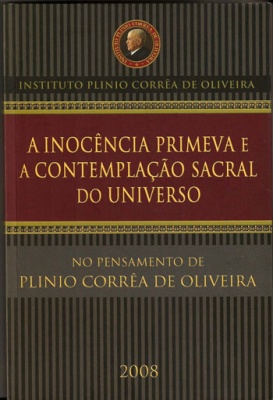Can you regain your innocence?
— Once a sinner sins, and his innocence has disappeared, is it all lost? Is it irrecoverable, or can it be restored?
There is no doubt restoration can take place. It is not simply the matter of converting a repentant sinner — though conversion is very much related with the theme — but of a return to the primeval state of internal harmony that constitutes innocence.
‘According to a legend from Brittany, France, in a certain place of Brittany there was a cathedral — the cathedral of Ys — which had been swallowed (engloutie) by the sea. Engloutie, in this case means tragically covered by the sea. It is the famous legend of the cathédrale engloutie.
‘From time to time, angels would ring the cathedral’s bells in the bottom of the sea. Those beautiful sounds would then rise, from layer to layer, all the way to the surface. And the fishermen going by, in a calm evening with a tranquil sea, would hear the mysterious bells ringing in the bottom of the ocean...’[1]
The fishermen say that one day the cathedral will return to dry land even more beautiful, as it is kept unscathed under the waves.
‘Everyone perceives the extraordinary beauty and poetry of this legend.
‘Primeval innocence is not something that the devil manages to tear out from our soul completely, but it remains like a cathédrale engloutie, a cathedral immersed in the waters of sin, which still exists in us. From time to time the bells of this innocence ring and make us feel some interior melody, some nostalgia, some hope, in some good passing hour.
‘Who among us has not feel that? — All of us have certainly felt it. — On what occasion?
On the thousand occasions that grace chooses. At one’s first Communion… here, there and everywhere.
‘The problem of the restoration of primeval innocence — to employ the metaphor of the immersed cathedral — is to make the buried cathedral of our innocence, which we keep inside us in the waters of sin, stop being immersed and rise back to the surface. Then the waters will drain and the cathedral will shine in the sunlight. The cathedral will have been restored.’ [2]
2. More than a pardon that we must conquer, it is forgiveness that reconquers us
Thus, the man who lost his innocence hears, so to speak, the bells of a submerged cathedral ringing inside his soul. He misses the time in which primeval order — comparable to a marvelous cathedral— dwelled in his soul.
This is a saving nostalgia:
‘No need to make scourging and dilacerating considerations about the lost paradise with which one broke and which broke with us. Instead, one should think the opposite: this paradise did not break with us and is knocking on our door all the time.’ [3]
They are the bells of the submerged cathedral that make themselves heard.
‘More than a pardon that we must conquer, it is forgiveness that conquers us back.’ [4]
‘It is superfluous to say how much one must cultivate reasoning, how careful it must be, how one must critique it to make sure it is correct. But there are moments in life when one realizes something that a simple reasoning would never be sufficient to stir up.’ [5]
So we must analyze what goes on around us to see whether the effects produced on our souls are according to reason. Of course, if they are not, they must not be accepted. But if they are, they may be the beginning of a path of refreshment, light and peace.
3. The restoration of innocence
We can and should ask Our Lady to restore our innocence and tell her:
‘There are moments, my Mother, in which my soul feels touched by an ineffable yearning. I long for the times in which I loved Thee, and Thou loved me in the vernal atmosphere of my spiritual life. I yearn for Thee, my Lady, and for the paradise which placed in me the great communication I had with Thee.
‘Doth Thou not also, my Lady, long for that time? Dost Thou not long for the goodness which existed in this son that I once was?
‘Come, therefore, the best of all mothers, and for the love of that which was blossoming in me, restore me; recompose in me that love for Thee, and make of me the complete realization of that son without stain which I would have been had I not been so miserable.
‘Give me, O my Mother, a repentant and humbled heart, and make shine anew before my eyes that which through the splendor of Thy grace I had once began to love so very much!
‘Remember, O Lady, this David and all the sweetness Thou didst place in him. So be it!’[6]
(by Plinio Correa de Oliveira in "Primeval Innocence and the Sacral Contemplation of the Universe")
[1] 12-27-1975.
[2] 12-27-1975.
[3] Undated.
[4] Undated.
[5] 3-31-1978.
[6] Prayer composed by the author in 1974.



No comments:
Post a Comment